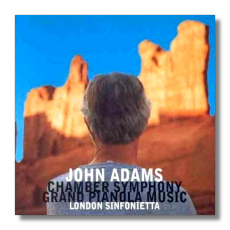
The Internet's Premier Classical Music Source
Related Links
- Adams Reviews
- Latest Reviews
- More Reviews
-
By Composer
-
Collections
DVD & Blu-ray
Books
Concert Reviews
Articles/Interviews
Software
Audio
Search Amazon
Recommended Links
Site News
 CD Review
CD Review
John Adams

Chamber Symphony
Grand Pianola Music
London Sinfonietta/John Adams
Elektra Nonesuch 79219-2 DDD? 52:54
What do you get when you cross Arnold Schoenberg at his thorniest with the soundtrack to a vintage Warner Brothers cartoon? You get John Adams' Chamber Symphony, written in 1992 for the San Francisco Chamber Players, and dedicated to his young son Sam. The symphony is in three movements: "Mongrel Airs" (an allusion to a British critic's silly comment that Adams' music "lacked breeding"), "Aria with Walking Bass," and "Roadrunner." Its fifteen-piece scoring resembles that of Schoenberg's eponymous work, although Adams characteristically adds a synthesizer, a trap set, trumpet, and trombone.
This work sounds like a new step forward for Adams. Its complex rhythmic and harmonic elements have not been so prominent in any other work of his that I've heard. Indeed, if Adams ever was stuck with the epithet "Minimalist," it certainly comes unstuck here. References include Stravinsky's and Hindemith's chamber music, but the Chamber Symphony doesn't sound at all derivative. Its emotional atmosphere is both disquieting and funny, like the movie "Pulp Fiction," but with a lot more substance and technical savvy. The third movement leaves the listener with the unsettling impression that the music is being played backwards.
If the Chamber Symphony is new and fresh, Adams' grandiose Grand Pianola Music already is something of a classic. The work is a musical depiction of a collision between camp and Serious Art, as schlocky tonic-dominant chords, forests of "Emperor" Concerto-like piano arpeggios, overbearing brass, seductive female voices, and gospel harmonies get tossed into the blender. Ranson Wilson, dropping his flute and picking up a baton, recorded it about ten years ago for EMI Records (CDC747331-2 - nla). Wilson did a good job, but the composer does even better. Everything is crisper and cleaner in Adams' version, and less Romantic. Elektra Nonesuch's sound is clearly superior too.
The composer's written words complement this release, whose only drawback is its shortish playing time. Even if you haven't responded to Adams in the past, you owe it to yourself to try his Chamber Symphony.
Copyright © 1996, Raymond Tuttle




















